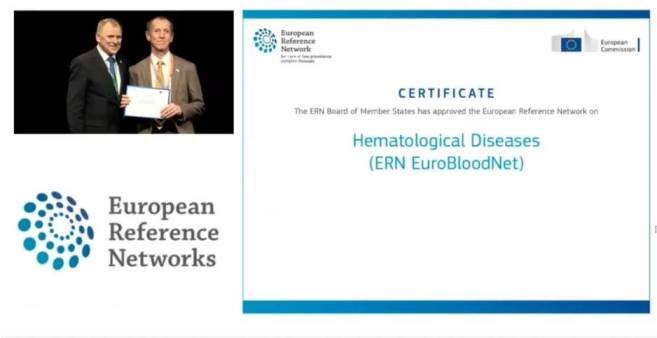EuroBloodNet, the European Reference Network on Rare Hematological Diseases, awarded by the EC as one of the approved ERNs

The first 24 ERNs were awarded by the EC at the Kick off meeting held in Vilnius 9th March
Over 6000 rare diseases affect the daily lives of around 30 million people in the EU. No country alone has the knowledge and capacity to diagnose and treat all rare and complex diseases, but by cooperating and exchanging life-saving knowledge at European level through European Reference Networks (ERNs), patients across the EU will have access to the best expertise available.
ERNs are virtual networks involving healthcare providers across Europe aiming to tackle complex or rare diseases and conditions that require highly specialised treatment and a concentration of knowledge and resources.
The first 24 approved ERNs were awarded in a two-day conference held last 9th-10th March in Vilnius organized by the European Commission and the Maltese Presidency of the Council and hosted by the Ministry of Health of Lithuania with more than 600 participants.
The ERNs cover 24 clinical areas and bring together more than 313 hospitals and almost 1000 healthcare units of expertise across 25 EU countries and Norway and involving thousands of players among health professionals, patients, healthcare providers and researchers. Over the next 5 years, ERNs are expected to reinforce their capacities to benefit thousands of EU patients suffering from a rare or complex condition.
One of the approved networks has been EuroBloodNet, the ERN on Rare Hematological Diseases, resulting from joint efforts of the European Hematology Asssociation (EHA), and the European Network for Rare Congenital Anemias (ENERCA). It is coordinated by Prof. Pierre Fenaux from the Hopital Saint Louis, Paris, together with Prof. Béatrice Gulbis from the University Hospital Erasme , Brussels.
EuroBloodNet’s main goal is to improve the healthcare and overall quality of life of patients with a rare hematological disease (RHD) by facilitating best practice sharing for safe and high-quality cross-border healthcare and developing more evidence-based clinical tools and cost-effective treatments.
The network brings together 66 highly specialized hospital centres in 15 Member States with expertise on malignant and non-malignant rare hematological diseases which will facilitate concentration of resources for the design, validation and implementation of high-quality and cost-effective services aimed at facing the challenges of RHD.
Involvement from the outset of patient associations will contribute to patient empowerment in keeping with EuroBlooNet patient-centred approach. For EuroBloodNet the hematology patient community elected five representatives: Amanda Bok (European Haemophilia Consortium), Angelo Loris Brunetta (Associazione Ligure Thalassemici Onlus), Jan Geissler (Leukemia Patient Advocates Foundation), Ananda Plate (Myeloma Patients Europe) and Sophie Wintrich (MDS UK Patient Support Group), ensuring that the patient voice is fully represented in the ERN Board and sub-clinical committees – a great achievement and a milestone in increasing the role of patients in clinical care as it evolves in Europe.
Vytenis Andriukaitis, European Commissioner for Health and Food Safety, and Christopher Fearne, Minister of Health, Malta stated that “Expectations are very high on what ERNs will achieve, and we have every confidence that such expectations can be met. The practical implementation starts now, but the benefits to rare diseases patients across Europe will be the true measure of its success. We need to work together towards this goal – national authorities, healthcare providers, health professionals, patients and researchers. Together we can transform this bold initiative into an outstanding success that will transform the lives of rare diseases patients across Europe.”
Let's work together!
